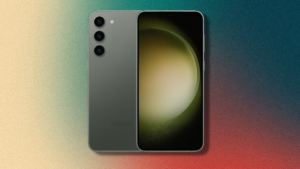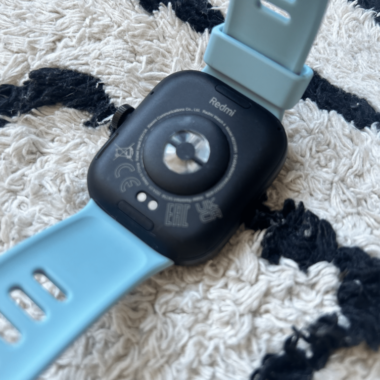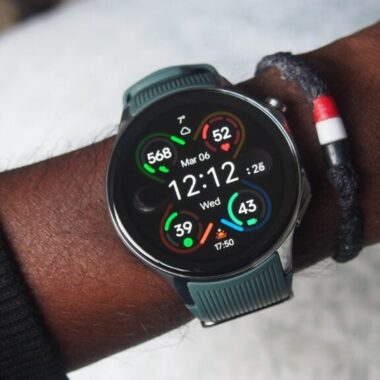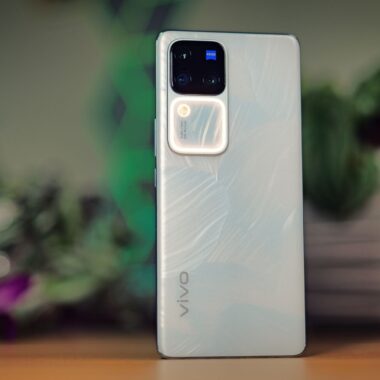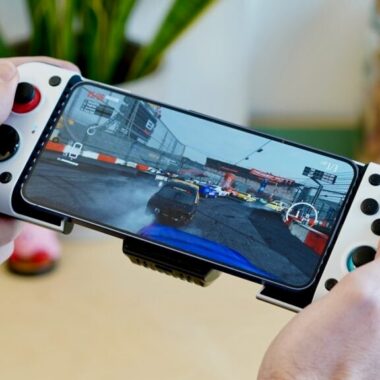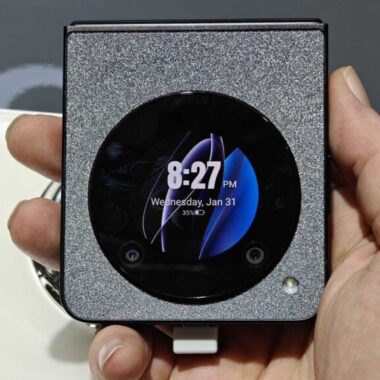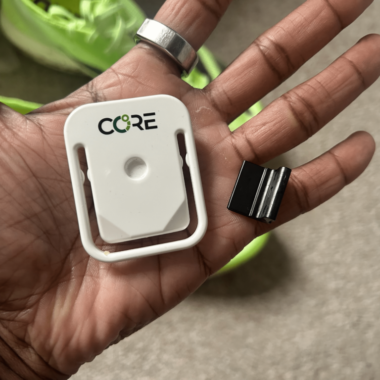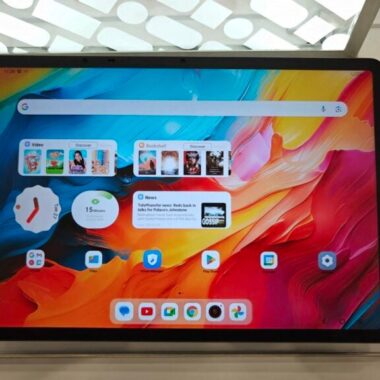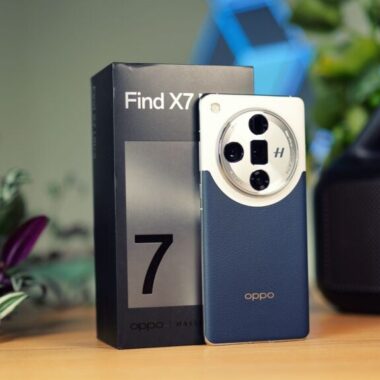Verdict
The release of the newer S24 Ultra doesn’t detract from the fact that the Samsung Galaxy S23 Ultra remains a strong all-rounder; it has a stellar display, a top-notch stylus experience, blisteringly fast performance and very good camera performance, even if it can’t quite compete with its replacement’s upgraded telephoto setup. Better yet, the price has dropped significantly since the release of the newer model, cementing its place as a very tempting 2024 phone.
Pros
- 200MP camera delivers in both well-lit and low-light conditions
- Top-notch performance from the Snapdragon 8 Gen 2 for Galaxy
- All-day battery life
- Stunningly detailed 6.8in 120Hz display
Cons
- Very expensive
- Relatively slow 45W charging
- Difficult to use one-handed
Key Features
-
Capable 200MP main cameraThe upgraded rear camera delivers some of the highest quality images from a smartphone, both in well-lit and low-light scenarios. -
Snapdragon 8 Gen 2 for GalaxyThe Galaxy S23 Ultra sports a unique top-end Snapdragon chipset exclusive to Galaxy devices. -
All-day battery lifeThe Samsung Galaxy S23 Ultra’s 5,000mAh battery can last all day without issue – even at WQHD+ resolution.
Introduction
Even with the release of the newer, shiner Samsung Galaxy S24 Ultra, 2023’s Samsung Galaxy S23 Ultra remains a stellar smartphone that shouldn’t be written off.
While the Ultra model of the Galaxy S series has always been one of the best Android phones around, the Galaxy S23 Ultra takes that to another level with its main 200MP snapper that delivers stunningly detailed shots in a range of scenarios.
Combine that with a trio of other rear-facing lenses, a gorgeous 6.8-inch dynamic AMOLED 2X display with 120Hz refresh rate, Qualcomm’s Snapdragon 8 Gen 2 for Galaxy chipset and a 5000mAh battery and you’ve got a seriously competitive phone, even if it is a year old.
Plus, our original complaint that the S23 Ultra was a little too pricey has now been remedied with the release of the newer model, with the S23 Ultra now available at a sub-£900 price if you know where to look.
That said, here’s how the Samsung Galaxy S23 Ultra stacks up a year after release in 2024.
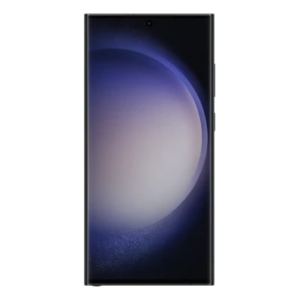
Save big on the Samsung Galaxy S23 Ultra SIM-free or with unlimited data
Mobiles.co.uk has already dropped two deals on the Samsung Galaxy S23 Ultra.
Pick up the latest Samsung phone, unlimited data, texts and minutes all for just £315 upfront and £45/month on Vodafone. That’s just £1395 over the course of the 2-year contract, which is less than the price of the phone outright.
Alternatively, you can pick up the 512GB phone SIM-free for £1249 and get double the data for the same price as the 256GB model.
- Mobiles.co.uk
- Unlimited data
- £315 upfront, £45 a month
Design and screen
- Boxy design makes it hard to hold one-handed
- IP68 dust and water resistance
- Built-in S Pen
The first thing you might notice about the Samsung Galaxy S23 Ultra is that it doesn’t look all that different from the Samsung Galaxy S22 Ultra, and that’s essentially because it isn’t.
Think of the Galaxy S23 Ultra as more of a refinement of the S22 Ultra’s design, with tweaks like a slightly flatter front glass with less curvature to the edges to slightly expand the usable area of the 6.8-inch display and a slightly (read: ever so slightly) tweaked rear camera lineup with slightly thicker bezels around the camera. Hey, you’ve got to be able to tell the difference between the two somehow, right?
If you are interested in a flat-screen Ultra, you’d be better serviced by the newer S24 Ultra. The new flat 6.8-inch screen is one of few physical differences between the S23 Ultra and the latest model.
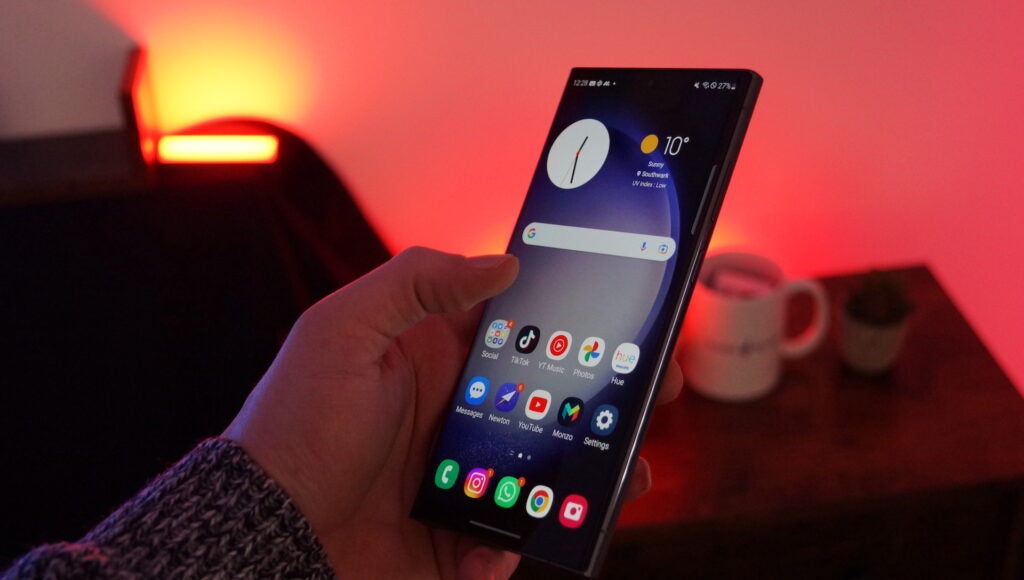

Beyond the slight differences in design, it’s very much business as usual for the Galaxy S23 Ultra. It’s still pretty hefty, meaning it will remain unwieldy when using it one-handed, though it does sit a little nicer in hand with the reduced curvature on the edges.
It doesn’t actually measure much larger than competing phones like the iPhone 15 Pro Max, but due to the boxy design, it just feels bigger in the hand – for better or worse.
The Galaxy S Pen stylus is present and accounted for, again found embedded within the body of the S23 Ultra for convenience, which will pop out with a simple press, and it remains a key feature exclusive to the top-end model.
It’s not just a basic stylus either, boasting lower latency than the Apple Pencil at an impressive 2.8ms that makes it feel incredibly responsive in use, with less of a line trailing behind the stylus as you write and doodle. You can also use the stylus as a remote capture button when taking group shots, and if you simply hate typing, you can use Samsung’s handwriting-to-text tech to turn your scribbles into legible text.
It’s undoubtedly one of the main reasons to opt for the Galaxy S23 Ultra compared to other big-screen flagships – that and the impressive cameras, but I’ll get to that in a bit.
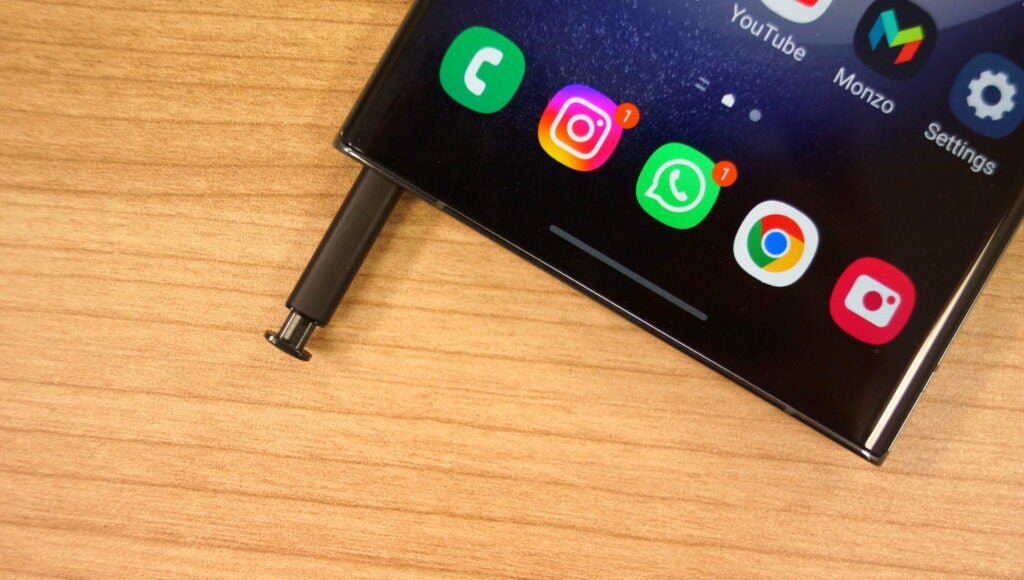

The available finishes are also now consistent with the rest of the Galaxy S23 range, available in phantom black, cream, green and lavender. In fact, the S23 Ultra’s design is now the default across the range with the S23 and S23 Plus ditching the contour camera housing for a similarly minimalistic look.
Screen
- 6.8-inch Dynamic AMOLED 2X display
- 120Hz LTPO-enabled refresh rate
- Fairly bright at 1750nits
The Galaxy S23 Ultra’s 6.8-inch dynamic AMOLED 2X display is truly something to behold with key specs including a dynamic 120Hz refresh rate with LTPO support that allows it to drop down to 1Hz to save battery life, support for both Dolby Vision HDR and HDR10+ and a pixel-packed QHD+ resolution.
With all that in mind, it should come as no surprise that the display is absolutely phenomenal in use, arguably more so than the S22 Ultra with the S23 Ultra’s flatter display – though as mentioned, the S24 Ultra is the one to go for if you’re after a truly flat screen. Regardless of shape, it offers great contrast and impressively vibrant colours without being too contrast-heavy and unnatural.
The QHD+ resolution makes it near impossible to pixel peep, even at close range, with everything from text to games looking as crisp as ever. It also makes all the difference when streaming 4K content from the likes of YouTube and Netflix. You can drop it down to FHD+ to save battery life, though I’ve not felt the need to during my time with the phone.
It also has a peak brightness of 1750nits that’s plenty bright enough for use even in bright sunny conditions, though it doesn’t quite compare to the 2024 flagship competition with the likes of the OnePlus 12 offering a whopping 4500nits peak brightness. Still, I never once struggled to use the phone when out and about, even on rare sunny days in London town.
It’s a good job, as you need an impressive high-res display to show off all those amazing 200MP snaps. Speaking of…
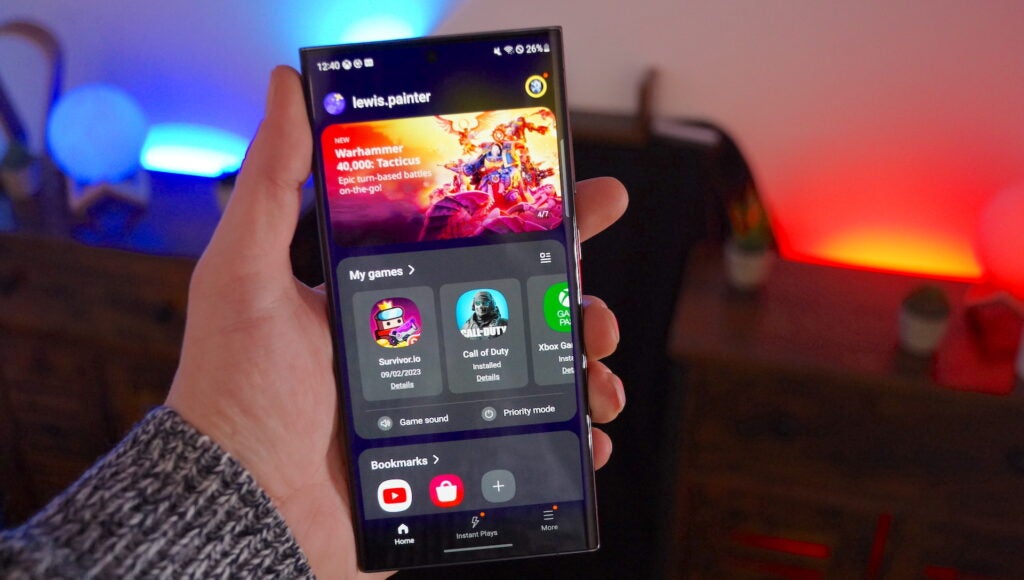

Cameras
- 200MP main camera is a game-changer
- Capable ultra-wide and telephoto lenses
- Up to 8K@30fps video with wide angle
If there’s one main reason to buy the Samsung Galaxy S23 Ultra, even in 2024, it’s the camera setup – and more specifically, the main 200MP camera Samsung has stuck on the rear alongside the already-capable 12MP ultrawide and dual 10MP telephoto lenses with 3x and 10x optical zoom respectively.
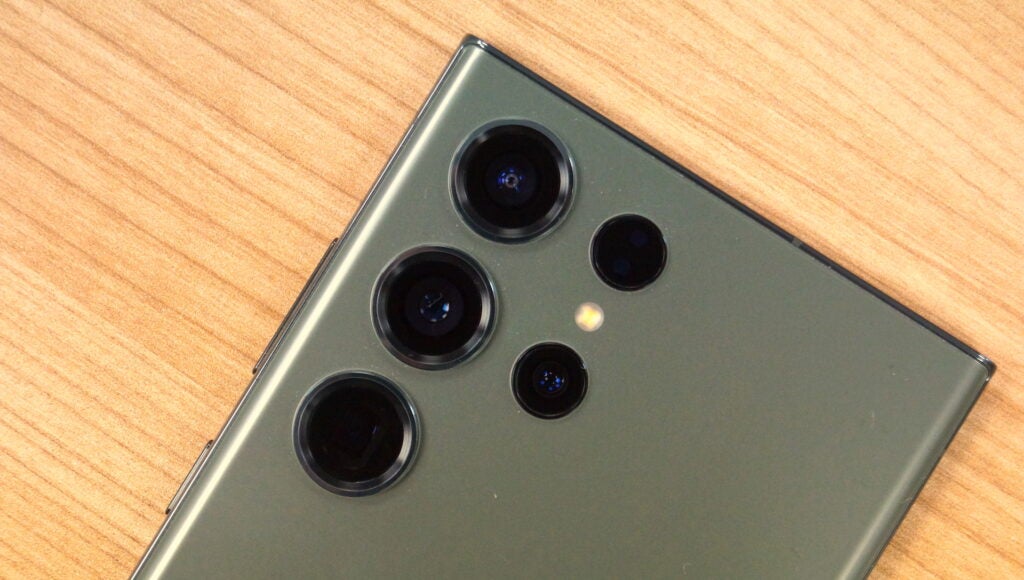

Simply put, the Samsung Galaxy S23 Ultra’s new 200MP snapper truly surpassed my expectations when it came to photography performance, both in well-lit and low-light conditions, with the latter delivering some of the best results I’ve seen from a smartphone to date.
Considering it uses 16-in-1 pixel binning to enhance detail and light, enhanced OIS with more range, a large 1/1.3in sensor and an f/1.7 aperture, it shouldn’t really be a surprise.
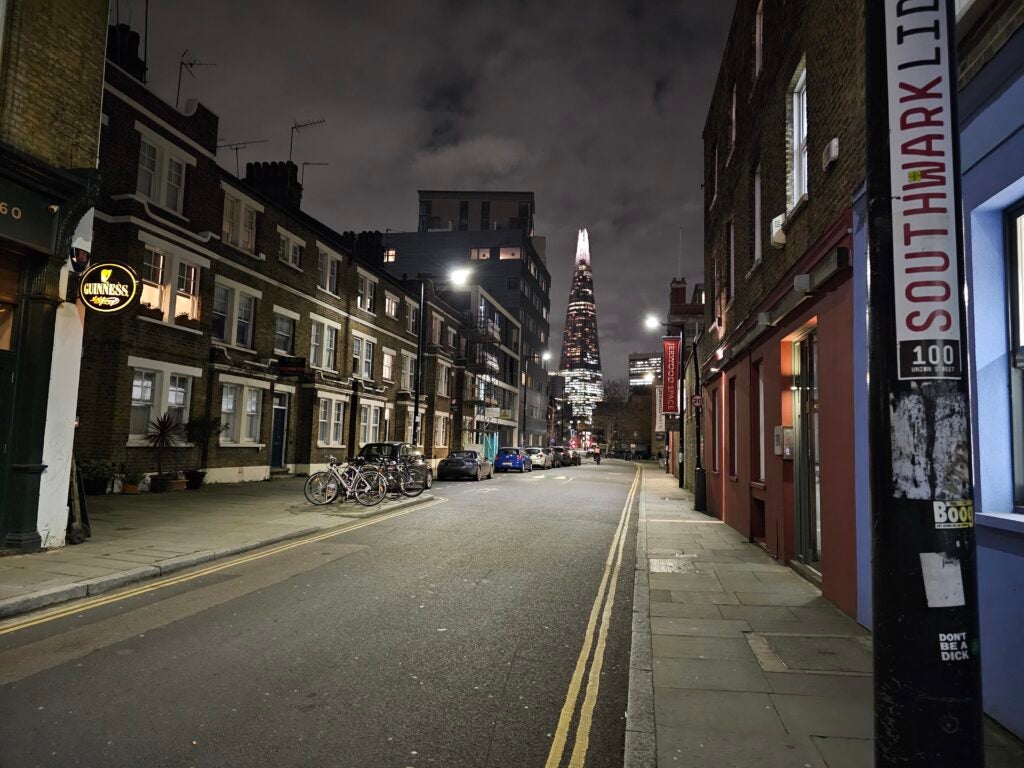

It’s almost effortless to capture images that look simply stunning on the S23 Ultra, regardless of the environment you’re in. It gave me real confidence that I could capture what I wanted wherever I wanted, be it taking a snap of a street sign in low-light conditions or getting a close-up of my gorgeous (but very fast-moving) dog Luna as the blazing sunsets in the background. Whatever I threw at it, it handled with ease.


Shots were well-lit with impressive HDR performance that brought notable gains to detail to the darkest and lightest areas of photos taken, with enough colour to look vibrant without looking too contrast-heavy and fake.


It’s low-light where the S23 Ultra’s 16-in-1 pixel binning shines brightest, with significant gains compared to last year’s S22 Ultra not only in terms of light captured but detail and colour, providing shots closer to what you see with the naked eye.
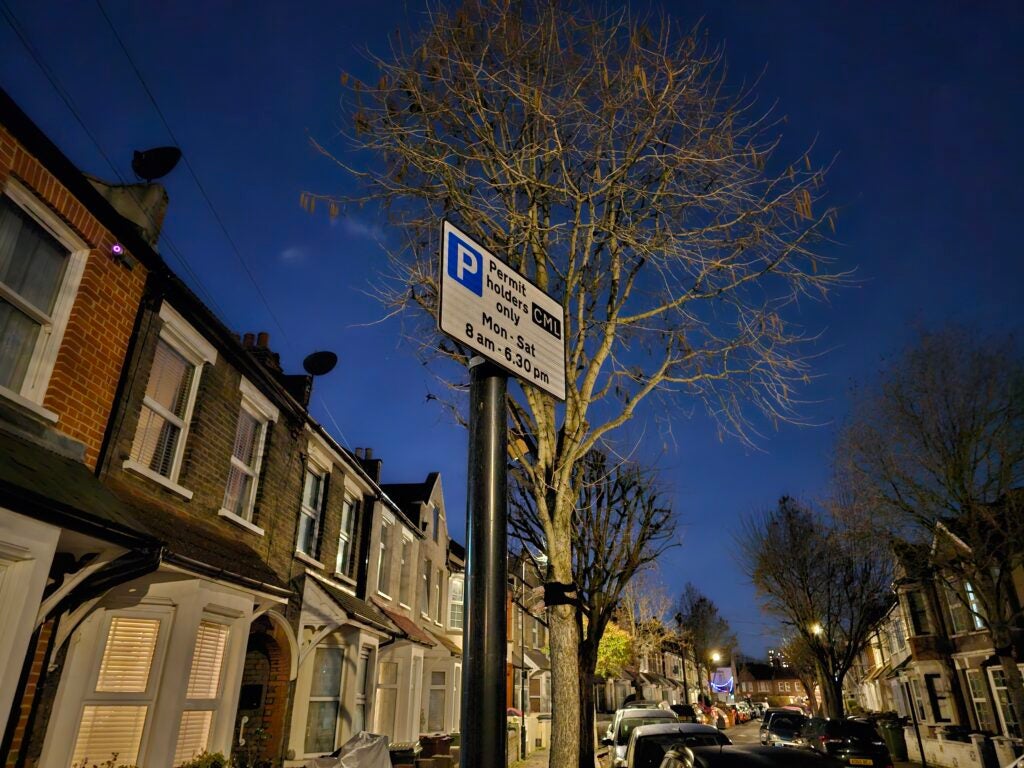

In fact, in some environments like my garden lit only by the moon, the S23 Ultra captured more than I could see. And, with the combination of laser and multi-directional PDAF autofocus, shots were always in-focus – something that can’t be said for all smartphone snappers, especially in low light.
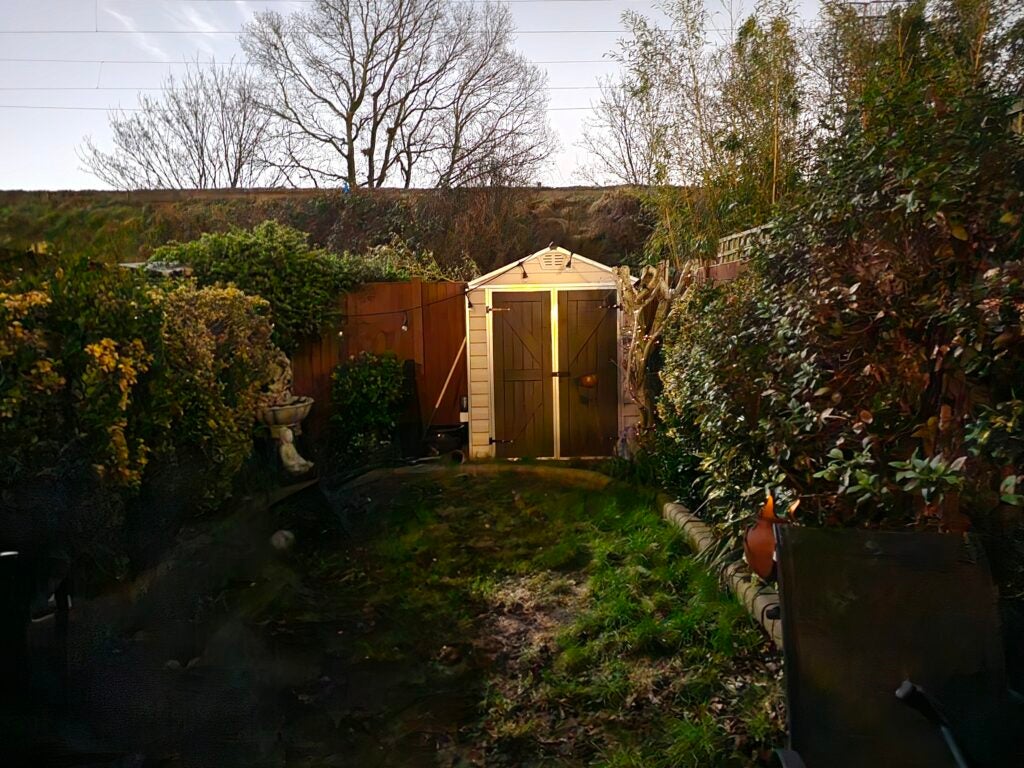

The camera also excels when combined with Samsung’s various camera tools including an upgraded Expert RAW mode that not only provides a boosted 50MP RAW capture and the ability to fine-tune your capture, but the ability to capture the stars using a new astrophoto mode – though that’s nigh-on impossible to test in the bright, cloudy night sky of London.
As much as I hate to admit it, I’ve already heard the now-famous “can you send me that?” tagline from the S23 Ultra’s new ad campaign from friends and family that I’ve snapped using the new main lens, and I’ve got a feeling that’ll continue for as long as I have the phone.
The best part? With the newer S24 Ultra using the same 200MP main lens, you’re not missing out on any advancements in camera tech by opting for the older model.
Of course, that’s not the only camera on the S23 Ultra – it’s just the icing on an already-capable cake. The trio of other lenses gives unparalleled versatility when it comes to mobile photography, allowing you to get as close or as far from your subject as you like with the option of up to 100x digital zoom to capture the moon on clear nights.
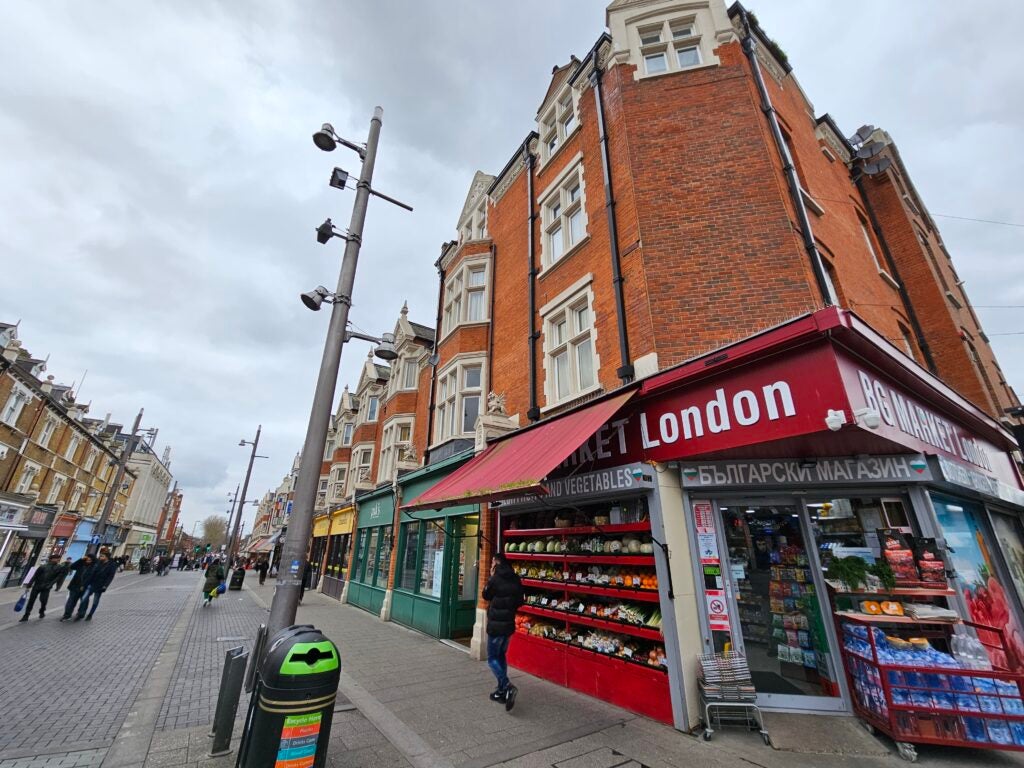

Though the quality doesn’t quite match up to the main 200MP snapper, each lens delivers a top-notch camera experience. Take the ultra-wide for example; the ultra-wide maintains that same high level of detail with its pixel binning tech without being too noisy in particularly detailed parts of images like grass and the leaves of trees, with much less noticeable distortion at the edges than other ultrawide lenses.
The 3X and 10X telephoto lenses are more limited in their use with an aperture of f/2.4 and f/4.9 respectively limiting their use in low-light conditions, but I was still pleasantly surprised by the quality of the capture overall, even if the focus was occasionally off. This is arguably where you’ll see more of a benefit by opting for the newer model, with an improved 5x telephoto with a much higher megapixel count than the 10x periscope it’s replacing.


It’s not just photography where the S23 Ultra excels either; it’s just as capable when it comes to its video offering. The key improvement here is 8K@30fps with a much wider angle than the S22 Ultra and most other flagships on the market. It’s gone from a highly cropped, low-framerate video that’s nothing more than a gimmick to something that could conceivably be used to capture absurdly detailed video.
Of course, that’s also a storage hog, so most people will likely drop down to 4K or even 1080p where the camera benefits from better image stabilisation and better performance in low-light environments. There’s also the ability to shoot at 960fps for slow-mo video, the ability to control various video controls in the Video Pro mode, and you can even shoot in HDR10+ for added dynamic range.
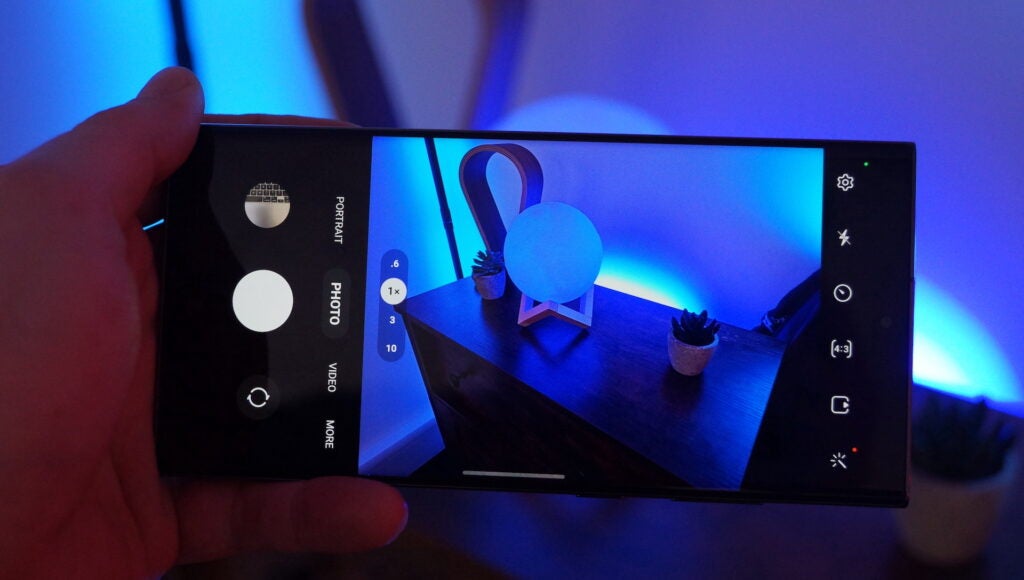

The focus enhancement tech does need a bit of work though, with the camera shifting between lenses far too often – even in videos – depending on how close it thinks you are to the video subject. It does this in an attempt to provide the best possible image, but it causes a stuttering effect with slightly different lens crops that makes videos jarring to watch.
Take a look at this example, courtesy of GadgetsBoy, to understand what I mean. My experience isn’t that dramatic, but it’s not far from it.
Flip the phone over and you’ll find a 12MP camera that, on paper, sounds like a downgrade compared to the 40MP selfie snapper of the S22 Ultra – but it’s far from it.
Featuring premium features like autofocus to provide a more natural bokeh in selfies, it’s great for capturing impromptu moments and taking video calls, though we’d leave video capture to the much more capable rear lenses, even if it does cap out at 4K@60fps.
Performance
- Top-end CPU & GPU performance
- Android 13 with OneUI 5.1
- Four years of OS upgrades promised
At the heart of the Samsung Galaxy S23 Ultra you’ll find a special version of Qualcomm’s top-end 2023 chipset dubbed the Snapdragon 8 Gen 2 For Galaxy, paired with either 8- or 12GB of RAM and either 256GB, 512GB or 1TB of UFS 4.0 storage.
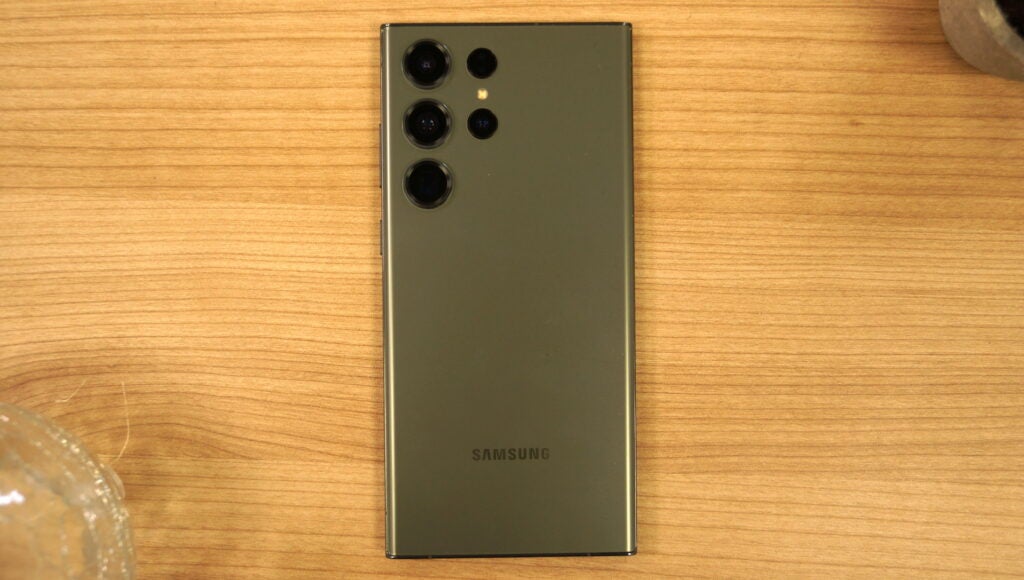

As the name suggests, it’s exclusive to Samsung devices, with the chipmaker claiming it boasts a slightly higher CPU clock speed as well as gains in graphics performance and power efficiency. On paper, it should give the S23 Ultra a boost compared to other 2023 flagships.
However, despite Samsung and Qualcomm’s best marketing efforts, it doesn’t seem like the extra power does that much – if benchmarks are to be believed, anyway.
Take the CPU for example; benchmarking the processing power using Geekbench 5 provided a multi-core score of 4527, which is actually a little less than the OnePlus 11’s 4856. Its single-core score of 1489 is a little more powerful than that of the OnePlus, but there’s not much in it.
There is a slight gain when it comes to graphics performance with a score of 3766 in the 3D Mark Wildlife Extreme GPU test, compared to 3532 of the OnePlus 11, and it’s a similar story in GFXBench too. But while it’s technically faster, the relatively minor difference means you won’t see much difference in terms of day-to-day performance.
Here’s how the Samsung Galaxy S23 Ultra compares to the competition:
That all said, the Samsung Galaxy S23 Ultra feels ultra-rapid and responsive in use, no doubt in part thanks to the 120Hz refresh rate that makes scrolling, animations and practically everything else that moves on the phone feel smoother.
You can swipe through menus as quickly as your fingers let you, play the latest AAA mobile games without worry (and even ray-tracing support, if games ever actually implement it) and images are captured without delay.
It really is a top-tier experience and something that I expect to continue with later versions of Android due to the sheer power on offer from the chipset.
It’s not quite as fast as the upgraded Snapdragon 8 Gen 3 for Galaxy within the S24 Ultra, but you’re unlikely to notice a difference in most real-world tasks. The real benefit to the upgraded chipset is Galaxy AI, but I’m getting ahead of myself here.
The audio experience is surprisingly decent with stereo speaker support that helps make videos more immersive when watching without headphones, and it can get pretty loud too, though it’s more tailored to voices and movies than the latest chart-topping bangers.
For music listening, headphones are still very much the way forward, with Dolby Atmos support providing great tuning for movies, music and podcasts. The phone also boasts the company’s special high-res Samsung Seamless Codec – though only if you’ve got the Galaxy Buds 2 Pro handy.
The phone shipped with Android 13 with Samsung’s latest OneUI 5.1 applied on top, although it has since had the upgrade to Android 14 and OneUI 6.0. While I’m usually a fan of stock Android (or as close to it as I can get) Samsung’s approach to the Android experience is a polished one, largely free of bloatware aside from a swathe of Samsung-branded apps that come pre-installed.
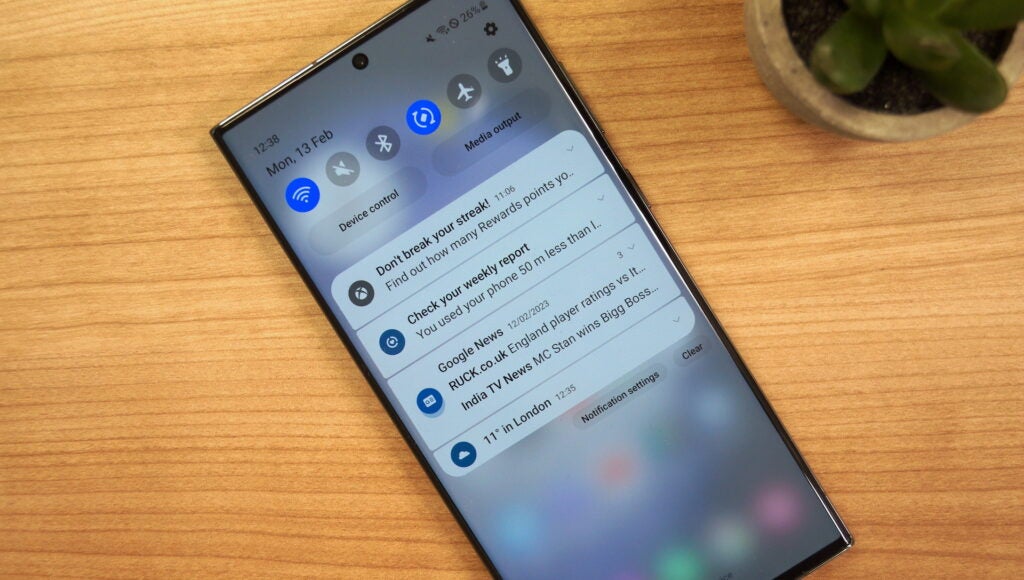

It’s easy to use with a very little learning curve if you’ve not used a Samsung phone before. There are tweaks compared to stock Android, most notable in areas like the Settings app and the notification shade with visually different layouts, but these are mainly for the good of the experience on offer.
It even offers exclusive features like the ability to reply to incoming calls via text using nothing but your voice, but these are handy additions rather than must-haves.
The only key area the S23 Ultra misses out on is Galaxy AI, a key new feature of the entire new Galaxy S24 range powered by Generative AI. It allows the newer phones to perform cool tricks like rewriting texts and emails, real-time translation, voice recording transcription and summarisation and new photo editing tools, all done entirely on-device without an internet connection.
However, Samsung has confirmed that some Galaxy AI features are headed to the Galaxy S23 Ultra sometime in 2024, so it’s not as bad as it could be.
Samsung has one of the best Android OS promises around with 4 years of OS upgrades and 5 years of security updates – at least, it did at launch. A year on, it doesn’t seem quite as tempting, especially when you consider both Samsung and Google have committed to a whopping 7 years of OS upgrades for its latest 2024 smartphones.
Still, if you’re on the lookout for a phone that’ll keep getting updates to keep it new and fresh for the next few years, the Galaxy S23 Ultra remains a great option.
Battery life
- 5000mAh battery
- Comfortable all-day battery life
- Comparatively slow charging
I must admit, I had reservations about the Samsung Galaxy S23 Ultra’s battery life in my initial ‘12 hours with the Galaxy S23 Ultra’ article, noting that the WQHD+ resolution really drained the battery.
However, after using it for over a week, those worries were unwarranted. It seems that there may have been background processes at play during the first few hours (or even the first day) of using the smartphone that drained the battery unnecessarily quickly, because since then, battery life hasn’t been an issue – and that’s at the full WQHD+ resolution.
I’m not exactly the definition of a power user but I do use my phone fairly regularly throughout the working day, be it listening to music or podcasts on my morning commute, sending messages, replying to tweets, chatting away on phone calls and maybe even playing a game of Survivor.io to pass the time on delayed train journeys.
With all that going on, I’ve only had the S23 Ultra hit the 20% mark once, with the phone usually ending the day with something closer to 40% charge on average. That’s a comfortable all-day smartphone that definitely alleviated my battery anxiety, but I don’t think it’d squeeze to a full two days without compromising on battery-hungry features like the high resolution and always-on display – though that is something I’m confident that the newer S24 Ultra could handle.
That’s backed up by testing, with a full hour of Netflix using just 7% battery, while half an hour of light gaming saw a drain of 5%.
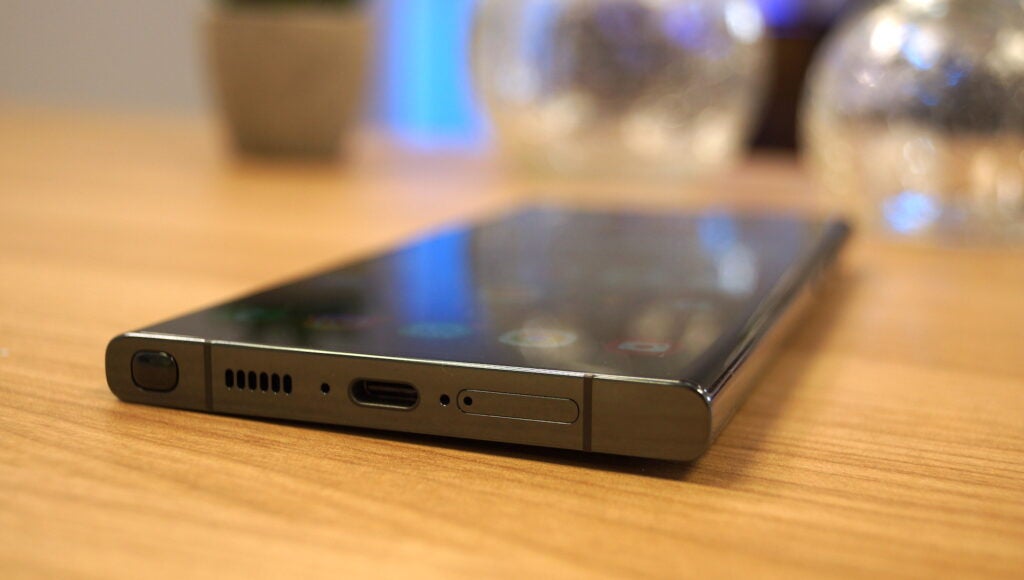

The only downside is the charging speed. The 45W charging remains unchanged from last year, and while that’s much better than what’s offered by Apple’s flagships, it is fairly slow when compared to the Android competition like the OnePlus 12 and its 100W SuperVOOC charging that provides a full charge in under half an hour – especially when paired with such a large-capacity battery.
For comparison, the Galaxy S23 Ultra took 28 minutes to reach the 50% mark and 1 hour and 31 minutes for a full charge. So yes, while it should easily be an all-day device, you’ll likely still need to charge it overnight.
Here’s how the battery and charging performance compares to the flagship competition:
Should you buy it?
You want the very best smartphone experience at a discount
The Samsung Galaxy S23 Ultra may no longer offer the best of the best smartphone tech, but it’s still pretty close and it’s now much more affordable too.
You want a phone that’ll charge quickly
Despite 45W charging, the Samsung Galaxy S23 Ultra charges much slower than the flagship competition.
Final Thoughts
The Samsung Galaxy S23 Ultra set the benchmark for what the best smartphone should be capable of in 2023, and even with the release of the newer Galaxy S24 Ultra, it remains a very tempting option at a now-discounted price.
The upgraded camera offering is undoubtedly the star of the show, with a new main 200MP snapper with advanced features like 16-in-1 pixel binning and the ability to individually enhance separate sections of photos delivering consistently impressive results with very little effort from the user. It also completely changes the game in low-light scenarios, delivering among the best results yet from a smartphone.
That’s backed up by capable ultra-wide and telephoto lenses that give the S23 Ultra a level of versatility hard for the competition to match.
It’s not just a capable camera though; the display, though relatively unchanged, boasts top-level performance, the S Pen offers one of the lowest latencies of any stylus, the Snapdragon 8 Gen 2 for Galaxy offers top-notch performance and the 5000mAh battery will get you through a day’s use without worry.
Yes, the newer Samsung Galaxy S24 Ultra has a flatter display, an improved 50MP 5x periscope lens and Samsung’s Galaxy AI tech, but if you want the core experience and don’t want to fork out for the latest model, the Galaxy S23 Ultra serves as a tempting, capable alternative.
FAQs
Yes, but at 45W, it remains unchanged compared to last year’s Samsung Galaxy S22 Ultra.
It’s a unique chipset produced by Qualcomm exclusively for Samsung devices, offering performance improvements compared to the standard chipset.
Jargon buster
mAh
An abbreviation for milliampere-hour and a way to express the capacity of batteries, especially smaller ones in phones. In most cases the higher the mAh, the longer the battery will last but this isn’t always the case.
5G
Offering faster download and upload speeds when compared to 4G. Great for game streaming and HDR video playback. Not supported everywhere yet and speeds vary wildly.
OLED and AMOLED
Types of displays that use self-lighting pixels to provide greater contrast and more vibrant colours than a typical LCD display, as well as sharper blacks.


